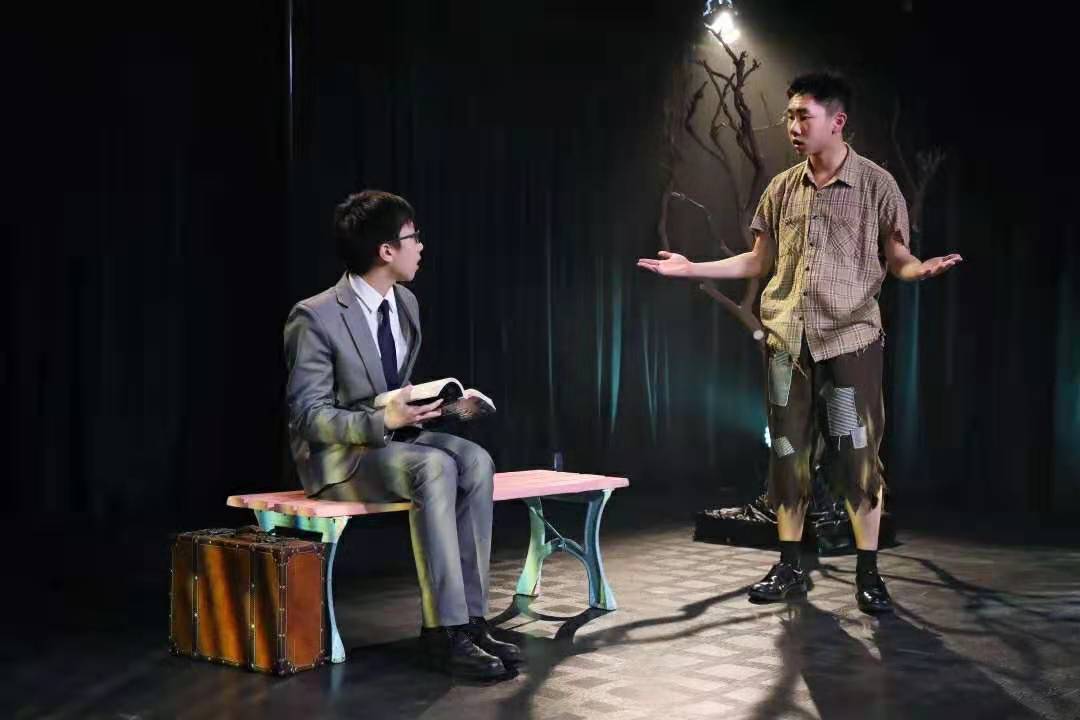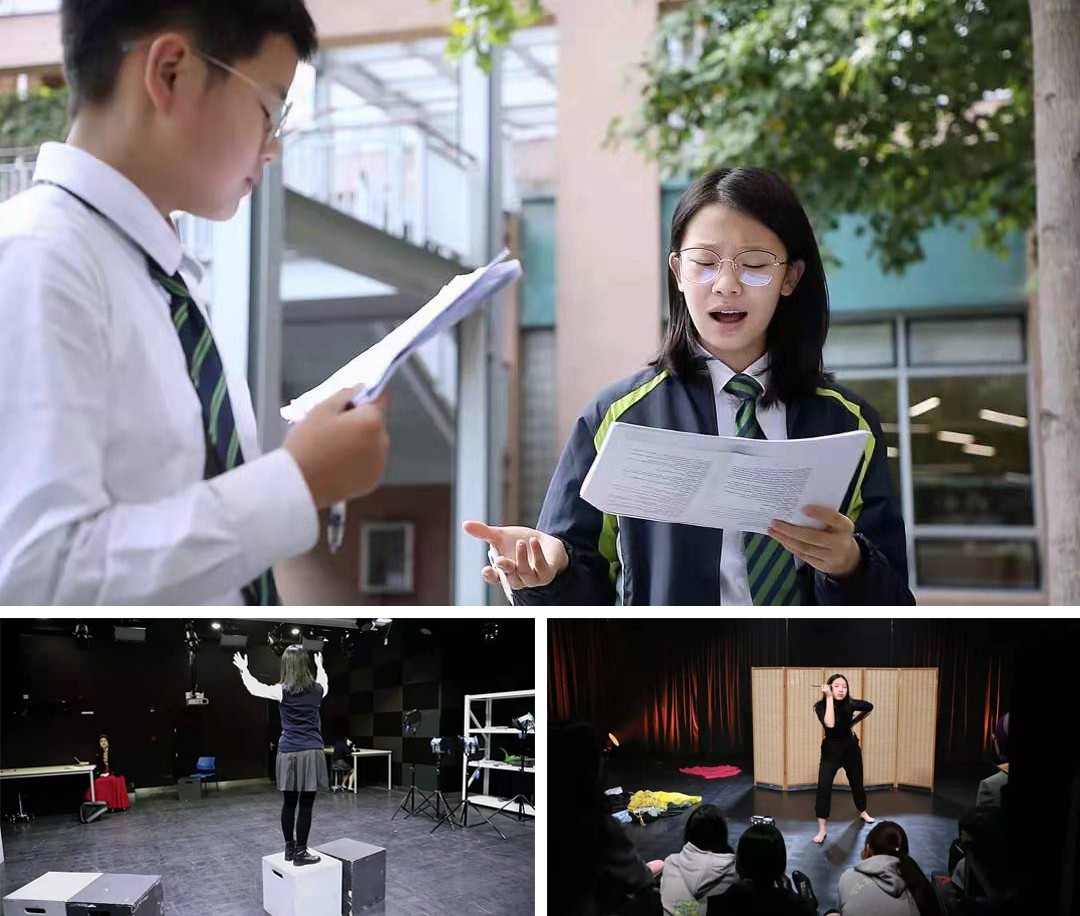The pursuit of drama – and the arts – embody the heart of Pao School’s philosophy of whole-person education. Through drama, the students learn to step into the shoes of characters from all over the world and reflect on their cultural experiences as they pen their own works. These experiences are just a part of creating well-rounded, skilled and empathetic students, and are embraced across all three of Pao School’s campuses through its curriculum, CCAs and student-led endeavours.
Over the past few months, the High Schools IGCSE and IB drama classes have been hard at work, the classrooms alive with rehearsals in preparation for the Drama Showcase. Watch the video to follow their journey to learn what goes on before the curtain rises.
At the High School, the students are able to follow drama through the IGCSE Drama and IB Theatre courses. The IB Theatre course first ran in 2018/19, after being requested time and again by students. Though the IB class only had five students in it’s first year, the school held many performances and provided world-class resources for the budding playwrites and thespians.
At IGCSE the students focus on performance, with activities such as student-devised drama, as well as group and individual performance of drama from published scripts. In the IB Theatre course, the students take a broader look at theatre, approaching the artform from the perspective of both as creators, designers, directors and performers. Alongside the development of their performance skills, the students learn to apply research and theory to inform their work, and contexualise it from contrasting artistic and cultural perspectives – including learning about different world theatre traditions such as Peking Opera.
Through the unpredictability of the stage, the students not only develop performance and presentation skills, but also become adept problem solvers and project managers. Due to the process-driven nature of the subject, the students learn through doing and testing out different ideas. It is natural that the students will face challenges and setbacks in this process, but through this they develop patience and perseverance, whilst strengthening their collaboration and communication abilities.

As the students approach a production, they go through a number of steps, developing different skills along the way:
Step 1: Theatre in Context
Before the students head to the stage, they first go through a period of research and analysis, to either learn more about their chosen piece or – for original work – begin consideration of what they would like to produce.
Step 2: Theatre Processes
After the students have completed the background research, they ‘explore’ more deeply into their piece. They need to use a mixture of research and analysis skills to consider how elements such as set design, staging, costumes and props may impact the audience.
Step 3: Rehearsal
The students start by performing pieces in isolation, scene-by-scene, to develop the structure of the performance and consider how to tell the story to the audience.
Step 4: Feedback
In IGCSE and IB, the students complete a mix of individual and group pieces, allowing them to develop their teamwork abilities. However, the feedback phase also allows a unique opportunity for students to reflect on one another's work constructively, alongside strengthening their collaboration and communication.
Step 5: Lighting Workshop
In the workshops, the students started by learning the fundamentals of set design and theatrical lighting, as the classes continued the techniques the students studied grew more sophisticated. The students were then able to apply this newfound knowledge to their pieces.
This year, the students were exceptionally fortunate to have workshops with lighting designer Danny Nolan. He has over 30 years experience with stage lighting for both live theatre productions and large-scale concerts. During his career, he has worked alongside world famous musicians such as Peter Gabriel and Sting.
Step 6: Production Phase
In the production phase, everything has started to come together, as the students start to run through the entire piece and consider it as a whole - rather than isolated scenes. This allows them to see themselves from the audience's point of view, and practice running more smoothly through the piece.
Step 7: Technical Run-throughs
In the technical run-throughs, it is time to begin tying everything together, rehearsing the play as a whole whilst also including the technical elements such as lighting and props.
Step 8: Dress Rehearsal
Lastly, the students put it all together and do a final rehearsal - perhaps making final tweaks before the big night!
Post-performance
When the production is complete, and the stage curtains are closed, the work is not yet finished. The students must complete essays using their director's notes - written throughout the entire process - to reflect on and analyse their piece, whilst justifying and considering the creative decisions they had made.

Kobus van der Colff, Head of High School Drama, explains these lessons will serve them for a lifetime, “The skills you get from drama are things that employers at top companies are looking for in this ever-changing world of ours – where you study something today and in five years it is out of date.”
Acting also provide the students with chance to develop empathy and imagination. Through a deep understanding of their characters – both their motivations and emotions – they are able transform their thinking. Richard, Y12, explains that this is his favourite part of studying the subject, “It just opens up so much possibility of being anywhere and doing things that I could never imagine myself to do in my real life. It is this kind of opportunity, and the infinite possibilities, that really fascinates me.”
Alongside the formal curriculum, Songjiang’s bustling drama culture is alive outside of the classroom in the school’s myriad CCAs and student-led groups.
For those that do enjoy featuring in a production, the past year of pandemic restrictions has been challenging – as it has often left the students left without an audience. Despite these limitations, the students have persevered with honing their craft. Last November, the SIX:45 Actors Ensemble completed performances of ‘Stay With Love’ both on campus for their classmates and to a full house off-campus.
Since 2018, Pao School’s Chinese Drama group, the Fan Xing Actors Ensemble, has produced five performances, focusing on theatre that represents Chinese language and culture. During their practices together the group not only focuses on performing, but also develops their skills through acting activities and studying plays. In 2019, they presented a well-received performance of 'Three Comedies’ by renowned playwrite Ding Xilin, which took a farcical look at three short acts surrounding relationships – one of which was performed in Shanghai and Guizhou dialects.
But drama extends beyond the stage. This semester, Cora Chen, Songjiang’s Drama Teaching Assistant, established the Pao Screenwriters CCA – inspiring students to write original Chinese language scripts for performance on the stage by FXAE. Cora says that students can develop story ideas in their mother language, and that writing is also a journey to discover their inner world and people around them through acting.
The school introduced the LAMDA CCA this year. The London Academy of Music & Dramatic Art (LAMDA), one of the oldest prestigious drama and performance schools in the world, has developed some of the most talented skills in the industry. The CCA allows students to take part in the LAMDA Drama Performance course, which has given them the opportunity to further develop their performance skills, get more one-on-one coaching and gain an extra qualification.
For a number of Pao School alumni, though they have graduated they have continued to pursue their love of the stage to university and beyond. For example, Irene (Class of ’20) has stayed on for a gap year at the school as a drama teacher, and will next year attend Brown University with an intended major in theatre.
My main goal is to try an engender a growth mindset with students, with the idea that skills can be developed with patience, with perseverance, and with practice. Drama is great because it can build confidence in a safe space, encourage students to try out new ideas, contemplate change, try out different things, make mistakes and learn through them… Through these kinds of experiences, I think students can really build skills that will not only help them cope in today’s world, but even thrive.
——Kobus van der Colff,
Head of High School Drama